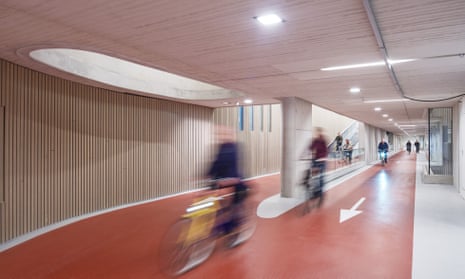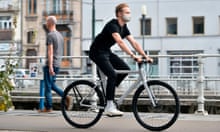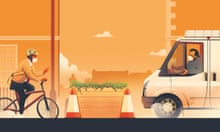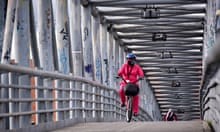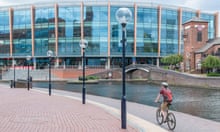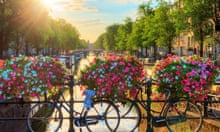In a nation with more bikes than people, finding a space to park can be a problem. The Dutch city of Utrecht is unveiling an answer at its railway station on Monday morning: the world’s largest multistorey parking area for bicycles.
The concrete-and-glass structure holds three floors of gleaming double-decker racks with space for 12,500 bikes, from cargo bikes that hold a family to public transport bikes for rent.
It is part of a strategy in which hundreds of millions of euros are being devoted to enhancing cycling infrastructure across the Netherlands, a nation so fervent about its two-wheelers that it is applying to add cycling to its inventory of intangible heritage.
“We are striving to make it a cyclists’ paradise and there’s still much to be done,” said Stientje van Veldhoven, a junior infrastructure minister. “I’d like us to make better use of what I call this secret weapon against congestion, poor air quality in cities and climate change that is also good for your health and your wallet.”
She added: “If you want to get people out of their cars and into public transport, you need to make sure using public transport is easy and comfortable. It needs to be very easy to park your bike as close to the train as possible – and you don’t want to be looking for half an hour for a space.”

According to the Dutch Statistics Office, 60% of all trips to work in the Netherlands are made by car and just a quarter by cycling – although in Amsterdam, Rotterdam, The Hague and Utrecht, (known as the Randstad region) cycling is more common.
Demand for public transport is growing, the main four cities are predicted to expand, and the Netherlands has been struggling to meet its climate crisis commitments, so encouraging more bike use is a political priority.
“In the next 10 years, 500,000 more people will come to urbanised areas, and if all of those people bring their car then we are going to have massive congestion,” said Van Veldhoven. “So investment in public transport, cycling lanes and cycle parking facilities is crucial to keep this area that’s essential for our national economy moving.”
The national railway service NS is investing tens of millions in bike parking, according to its spokesman, Geert Koolen. “We have over 1 million train passengers a day and in our bigger cities – like Utrecht – more than half arrive at the station by bike,” he said. “At Dutch stations there are some 490,000 parking spaces for bikes and we expect 5 million bicycle rides on OV-fiets [shared public transport bikes] in 2020.”
Utrecht is promoting cycling as part of a “healthy urban living” policy. “We are counting on biking as a healthy and sustainable form of transport for a growing city,” said the deputy mayor, Victor Everhardt. “Cycling is in the genes of people from Utrecht and in 1885 it built the Netherlands’ first bike lane. Every day, 125,000 cyclists go through the city centre to work, school and the station, and the world’s largest bike park sits perfectly in this global cycling city.”

The scale of Dutch investments shows cycling is about more than just the issue of transportation, according to BYCS, a social enterprise behind a network of international cycle mayors. “The bike park in Utrecht shows you need massive investments into cycling infrastructure parking, cycle lanes and great architecture, but we believe this is one of the most impactful things a city can do,” said its strategy director, Adam Stones. “If you look at it as transformation – how it addresses mental and physical health, brings communities together and addresses resource use and the environment – you put more weight behind it.”
But some experts sound a note of caution. Although the Fietsersbond, a Dutch cycling organisation, warmly welcomes the investment, it warns that it is irritating and counterproductive when bike parks are combined with a no-tolerance policy to on-street parking – as in central Amsterdam, where “wild” parked bikes are confiscated.
“I am not a fan of this,” said its director, Saskia Kluit. “There’s a grey area growing where the government wants a clean appearance and wants to get rid of the bikes, but parked bikes give the street liveliness and movement, and if you want the benefit of the cyclist shopping, it’s better they can stop everywhere they want.”
Follow Guardian Cities on Twitter, Facebook and Instagram to join the discussion, catch up on our best stories or sign up for our weekly newsletter
